We may not have the course you’re looking for. If you enquire or give us a call on +61 1-800-150644 and speak to our training experts, we may still be able to help with your training requirements.
We ensure quality, budget-alignment, and timely delivery by our expert instructors.
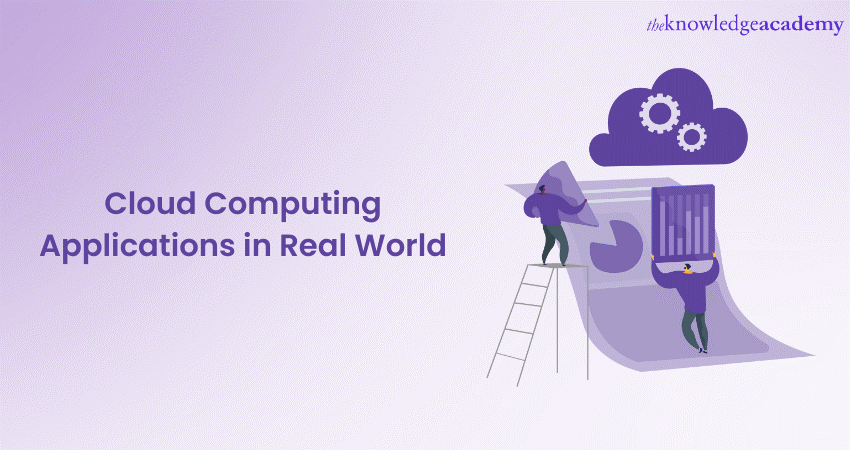
Cloud Computing has revolutionised how businesses and individuals store, process, and access data. As this technology becomes more prominent in everyday life and organisations, Cloud Computing Applications have become frequent in various fields, ranging from finance to entertainment.
Cloud technology is utilised across various industries, such as healthcare, finance, e-commerce, and entertainment. If you wish to understand the various uses of Cloud Computing, thus gaining insights into its potential and impact on everyday life, this blog is what you need. Keep reading this blog to learn about Top Cloud Computing Applications in the real world!
Table of Contents
1) What are the applications of Cloud Computing?
a) Cloud Computing in healthcare
b) Cloud Computing in finance
c) Cloud Computing in e-commerce
d) Cloud Computing in entertainment
2) Conclusion
What are the applications of Cloud Computing?
Cloud Computing has revolutionised industries across the board, providing a wide range of use and benefits. Some Benefits of Cloud Computing include big data analytics, enabling the processing and analysis of vast datasets while also supporting the growth of the Internet of Things (IoT) and facilitating Artificial Intelligence (AI) and Machine Learning (ML) applications. Some prominent applications of Cloud Computing are as follows:
Learn the details of different Cloud services with our Cloud Computing Courses!
Cloud Computing in healthcare
Cloud Computing in Healthcare provides organisations with cost-effective solutions by eliminating the need for extensive on-site infrastructure and maintenance. Cloud platforms allow healthcare providers to store and access patient data, medical records, and other critical information securely and efficiently. The scalability of cloud resources ensures that healthcare organisations can easily accommodate fluctuations in data volume and user demands.
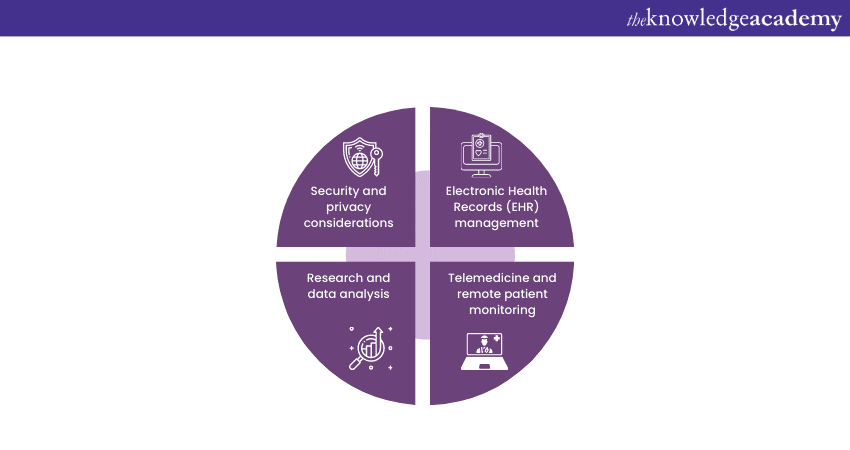
Electronic Health Records (EHR) management: Cloud Computing plays a vital role in managing EHRs. Storing EHRs on the cloud allows centralised patient information access, promoting coordinated and integrated care across different healthcare providers.
Cloud-based EHR systems enable real-time updates, secure data sharing, and improved patient engagement. Healthcare professionals can access patient records from any location, streamlining workflows, reducing errors, and enhancing overall patient care.
Telemedicine and remote patient monitoring: Cloud Computing has revolutionised telemedicine and remote patient monitoring. Through cloud-based platforms, healthcare providers can offer virtual consultations, remote diagnostics, and continuous monitoring of patient's vital signs.
Cloud infrastructure supports the secure transmission of medical data, including video conferencing, digital imaging, and sensor data, allowing healthcare professionals to remotely assess patients' conditions and provide timely interventions. This technology has been particularly valuable in delivering healthcare services to underserved areas and improving patient outcomes.
Research and data analysis: Cloud Computing empowers healthcare researchers by providing them with access to massive computing power and storage capabilities. Researchers can leverage cloud platforms to store and analyse vast amounts of healthcare data, facilitating advanced data analytics, machine learning, and artificial intelligence applications. Cloud-based research platforms enable collaborative research efforts and accelerate the development of new treatments, diagnostics, and healthcare innovations.
Security and privacy considerations: Cloud Computing Security and privacy are paramount in healthcare, and introduces unique challenges. When utilising cloud services, healthcare organisations must ensure data encryption, secure authentication, and robust access controls.
Compliance with the regulations such as Health Insurance Portability and Accountability Act (HIPAA) is vital in safeguarding a patient's privacy. Cloud service providers employ advanced security measures, including regular audits and intrusion detection systems, to protect sensitive healthcare data.
Learn to handle cloud infrastructure and virtual machines with Cloud Computing Training!
Cloud Computing in finance
Cloud Computing is utilised in the finance industry, focusing on cost-effective infrastructure, high-frequency trading and risk management, fraud detection and prevention, regulatory compliance, and data analytics.
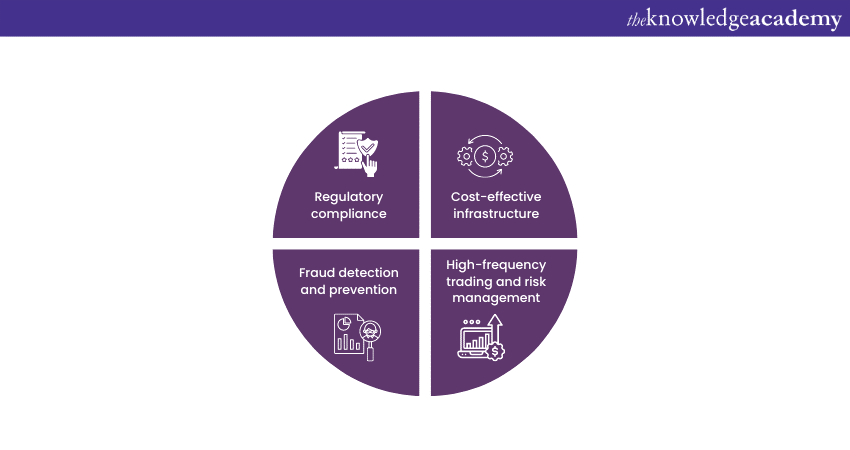
Cost-effective infrastructure: Cloud Computing offers the finance industry a cost-effective alternative to traditional on-premises infrastructure. Financial institutions can leverage cloud platforms to reduce upfront capital expenses, lower maintenance costs, and pay for resources on a usage-based model.
Cloud infrastructure allows for scalability, enabling financial organisations to handle fluctuating workloads, process large volumes of data, and meet demanding computational requirements without investing in additional hardware.
High-frequency trading and risk management: Cloud Computing plays a vital role in High-Frequency Trading (HFT) and risk management in the finance sector. By leveraging cloud platforms, trading firms can access powerful computing resources and low-latency networks, facilitating rapid trade execution and analysis.
Cloud-based risk management systems provide real-time risk assessment, portfolio optimisation, and scenario analysis, enabling financial institutions to manage risk effectively and make more informed decisions.
Fraud detection and prevention: Cloud Computing enhances fraud detection and prevention capabilities in the finance industry. Cloud-based solutions enable the analysis of vast amounts of data from diverse sources, allowing for the identification of suspicious patterns and anomalies.
Machine learning algorithms running on cloud infrastructure can detect fraudulent activities in real-time, such as unauthorised transactions or identity theft. Additionally, cloud-based fraud prevention systems enable the rapid sharing of threat intelligence among financial institutions, improving overall security measures.
Regulatory compliance: Complying with stringent financial regulations is a crucial aspect of the finance industry. Cloud Computing helps financial organisations meet regulatory compliance requirements efficiently.
Cloud service providers offer robust security measures, data encryption, access controls, and audit trails to ensure the compliance with regulations such as the Payment Card Industry Data Security Standard (PCI DSS) and the General Data Protection Regulation (GDPR). Cloud infrastructure also enables seamless data backup and disaster recovery, ensuring business continuity and meeting compliance obligations.
Try our Microservices Architecture Training and learn concepts of load balancing!
Cloud Computing in e-commerce
Cloud Computing is applied in the e-commerce industry, focusing on scalable infrastructure, customer relationship management, inventory and supply chain management, analytics and business intelligence, and seamless payment processing.
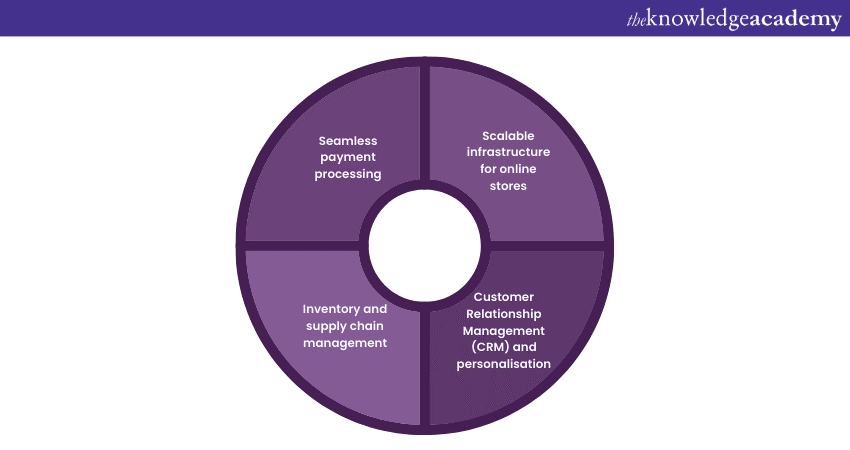
Scalable infrastructure for online stores: Cloud Computing provides e-commerce businesses with a scalable infrastructure to accommodate fluctuating demands. Cloud-based infrastructure allows for the automatic scaling of resources based on demand, enabling e-commerce businesses to expand or contract their operations seamlessly without upfront investments in hardware or infrastructure.
Customer Relationship Management (CRM) and personalisation: Cloud Computing plays a crucial role in CRM and personalisation for e-commerce. Cloud-based CRM systems centralise customer data, allowing businesses to track customer interactions, preferences, and purchase history across multiple channels.
Inventory and supply chain management: Cloud Computing revolutionises inventory and supply chain management in e-commerce. Cloud-based platforms enable real-time tracking of inventory levels, automated order management, and seamless integration with suppliers and logistics partners. Cloud-based solutions also facilitate data sharing and stakeholder collaboration, improving visibility and coordination throughout the supply chain.
Seamless payment processing: Cloud Computing facilitates seamless payment processing for e-commerce businesses. Cloud-based payment gateways provide secure and efficient payment processing services, enabling businesses to accept multiple payment methods and currencies. Cloud-based payment solutions also offer built-in fraud detection and prevention measures, minimising the risk of unauthorised transactions.
Try our Terraform Training to gain familiarity with loops, syntax and statements!
Cloud Computing in entertainment
Cloud Computing has various applications in the entertainment industry, focusing on media streaming and content delivery, virtual and augmented reality experiences, gaming as a service, collaborative content production, and data-driven audience engagement.
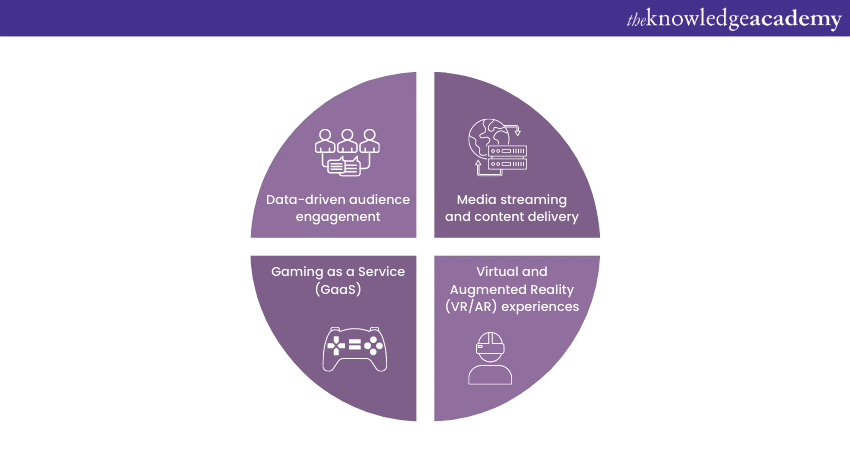
Media streaming and content delivery: Cloud Computing is critical in media streaming and content delivery services. Streaming platforms leverage cloud infrastructure to store and deliver large volumes of media content to users worldwide.
Cloud-based Content Delivery Networks (CDNs) ensure low-latency streaming by distributing content across multiple servers geographically. This enables seamless and high-quality streaming experiences for users, regardless of location, while reducing bandwidth costs for content providers.
Virtual and Augmented Reality (VR/AR) experiences: Cloud Computing enables the delivery of immersive virtual and augmented reality experiences. Cloud-based VR/AR platforms provide the necessary computational power to process complex graphics and deliver real-time interactions. By offloading the heavy computational requirements to the cloud, VR/AR applications can be accessed on various devices, from smartphones to VR headsets, making these experiences more accessible to a wider audience.
Gaming as a Service (GaaS): Cloud Computing has transformed the gaming industry through the concept of GaaS. Cloud-based gaming platforms allow users to stream video games directly from the cloud, removing the need for expensive gaming hardware.
Cloud gaming provides on-demand access to a vast library of games, seamless updates, and cross-platform compatibility. It also enables multiplayer gaming experiences, as the cloud handles the processing and synchronisation of game data for players worldwide.
Data-driven audience engagement: Cloud Computing enables data-driven audience engagement strategies in the entertainment sector. Cloud-based analytics platforms collect and analyse audience data from various sources, such as social media, streaming platforms, and ticketing systems. Cloud-based analytics also enable personalised recommendations, targeted advertising, and real-time audience interaction during live events.

Conclusion
Cloud Computing Applications are prominent in various industries, such as healthcare, finance, e-commerce, and entertainment. Hopefully, this blog has aided you in understanding how this technology's scalable infrastructure, enhanced data analytics capabilities, and seamless collaboration have transformed operations, leading to improved efficiency and personalised experiences.
Upcoming Cloud Computing Resources Batches & Dates
Date
 Cloud Computing Training
Cloud Computing Training
Thu 6th Mar 2025
Thu 22nd May 2025
Thu 24th Jul 2025
Thu 4th Sep 2025
Thu 11th Dec 2025






 Top Rated Course
Top Rated Course


 If you wish to make any changes to your course, please
If you wish to make any changes to your course, please


